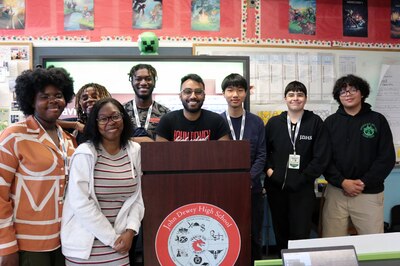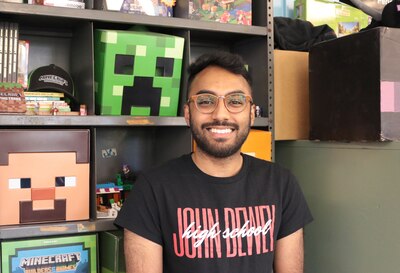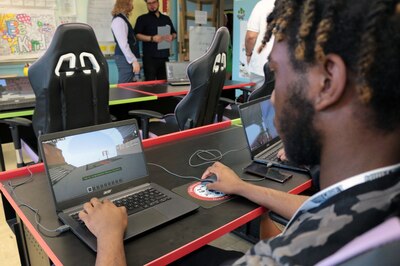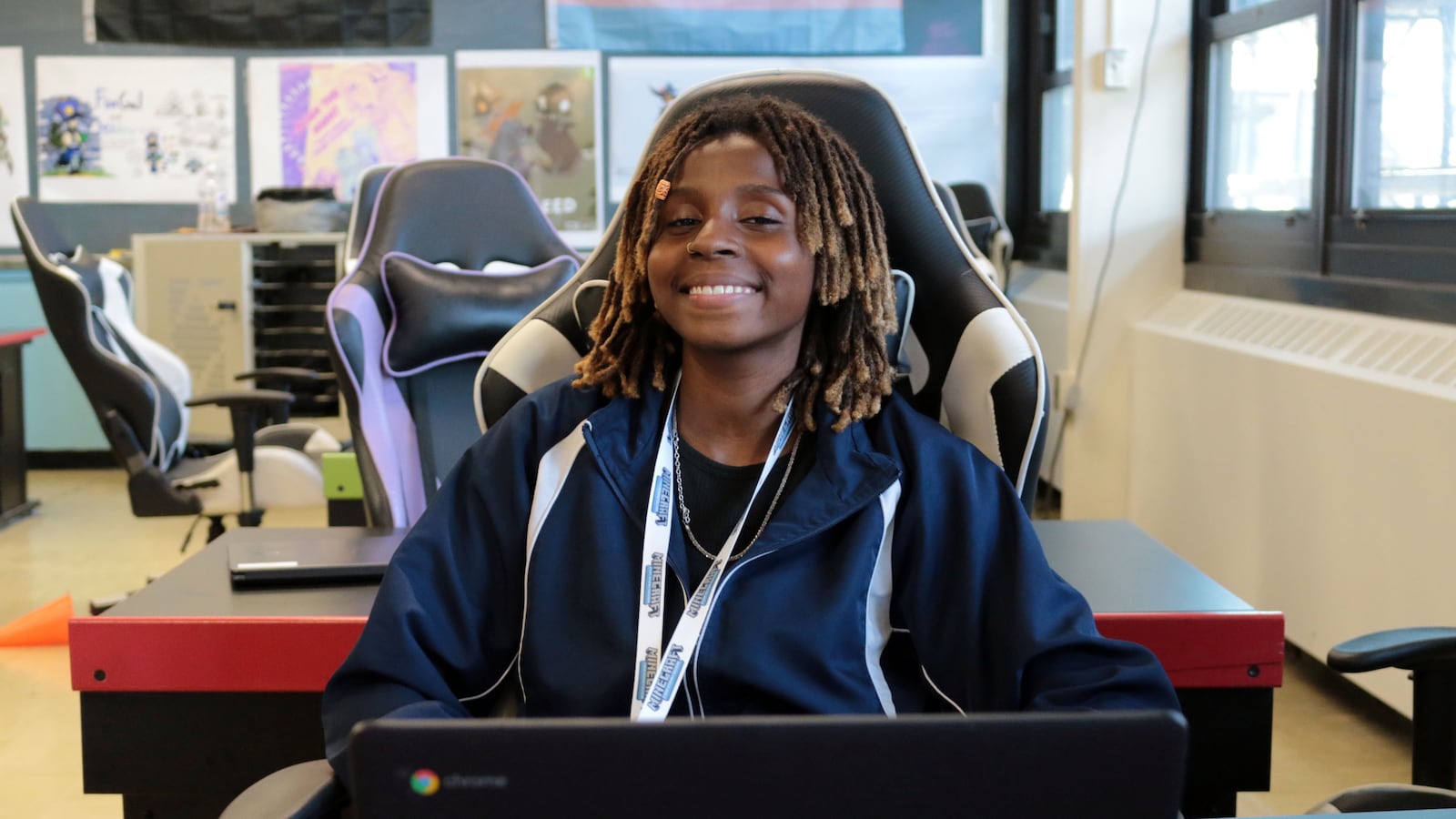Sign up for Chalkbeat New York’s free daily newsletter to keep up with NYC’s public schools.
John Dewey High School senior Jayla Mallette had an unusual request for her teacher after 9 p.m. a few months back. She was so excited about a project that she wanted permission to work on it through the night.
Jayla and her peers at the Brooklyn school were collaborating on a design to repurpose the Kingsbridge Armory, a hulking landmark in the Bronx that has fallen into disrepair. But the online platform — Minecraft Education — requires permission to log on outside of approved hours.
Their teacher, Mashfiq Ahmed, signed off right away. “I would leave it on overnight,” he said. “Sometimes I would wake up in the morning and would see them still in the server.”

The project the students were so excited about that they could hardly sleep? Their submission to the city’s annual Minecraft competition.
Four years ago, New York City officials created a citywide tournament called Battle of the Boroughs that allows public school students to compete in an annual Minecraft challenge. Students typically must submit projects — or “builds” in Minecraft parlance — following specific prompts that are supposed to get students thinking about principles of urban planning, sustainability, and community development to improve the city.
As interest in the competition has grown, with about 500 submissions this year, the team at John Dewey has become a powerhouse. They’ve won multiple titles, including last year’s citywide championship. They’re the subject of a short documentary released by Minecraft Education. Later this month, they’re headed to a national competition in Denver — the first New York City public school Minecraft team to win the honor, according to city officials.
And they’ve worked to spread Minecraft to teachers from Dewey and across the city, explaining how they can use the game in their lessons. Those efforts prompted two Dewey English teachers to guide their students to use Minecraft to build a dystopian society.
“It’s a sandbox game – you can do anything,” explains Jayla, the president of Dewey’s Minecraft club. “It just captured my mind. You can show your creativity.”
Unlike many other video games, Minecraft generally does not have set rules or goals. Any player can use it to tinker, write code, build a world, or even create their own mini-games. Experts often compare it to open-ended toys like Legos that allow nearly infinite permutations. It has grown to become one of the most popular video games of all time.
From a Minecraft competition to career planning
Jayla first got into Minecraft when she was about eight, but didn’t play it much until COVID forced school buildings to shutter.
“School got easier so I was talking to my friends more and playing Minecraft throughout the school day,” Jayla said. “It’s just really easy to connect people.”

That’s also when John Dewey’s Minecraft club began. Ahmed, who teaches chemistry in addition to coaching the Minecraft team, saw it as a way for students to “de-stress” and build social connections during the pandemic.
But the club has morphed into much more than that to Jayla and her classmates. For a few of them, it’s helped guide their planning for college and beyond.
“Seeing how you can fix things in the community just hits a spot in my brain,” Jayla says. She estimates she spent about 72 hours on the build submission for this year’s tournament over about three months. “Without this club, I don’t think I would have ever realized I wanted to go into city planning.” She plans to study the subject at the Borough of Manhattan Community College in the fall.
As the team prepares to defend its citywide title against other high schools this Saturday at the Brooklyn Public Library, Jayla has been reading on her own about what makes a “walkable” neighborhood. The five students on the official team will only learn the prompt just before they start building — with about 45 minutes to conduct research and roughly 30 minutes to complete their design followed by an oral presentation of their project — but Jayla figures the reading might come in handy.
Earlier this week, Dewey senior Rayden White and the rest of the Minecraft club, were preparing for the championship and showing off the team’s initial Kingsbridge Armory submission to a gaggle of television reporters.
Perched on one of the special gaming swivel chairs the team won as a prize in last year’s city championship, Rayden navigated through cavernous rooms that included a library, market, art gallery, and other amenities like a roller skating rink. After conducting research about the surrounding Bronx neighborhood, including its poverty rates, Rayden and his classmates opted to include a food pantry and clothes donation site.
The process made him begin to notice food access issues in other areas of the city. “I didn’t really take into account how much that might be needed in a community,” he said.

Each student often takes a slightly different role in the builds. Jayla, whose teammates refer to her as the “ideas person,” used her apprenticeship experience at the Brooklyn Botanic Garden to design a greenspace. Rayden is especially adept at using “redstone,” essentially the game’s internal circuitry. He used that expertise to electrify a digital sign outside an arcade the team built in the armory, with each letter repetitively lighting up in sequence.
He grew up taking apart his family’s old computers but he said Minecraft has turbocharged his interest in technology. “It started with Minecraft,” he said. “I learned how it worked and that’s how I got into coding.” He plans to study computer science next year at the New York City College of Technology.
Dewey’s reputation rises after Minecraft club’s wins
Dewey administrators said the Minecraft club has helped bring welcome attention to the school, which narrowly avoided closure more than a decade ago due to poor performance and whose former principal was implicated in an illicit credit recovery program. In recent years, the school has rebuilt its reputation as a leader in career education, scoring a visit from schools Chancellor David Banks.
Assistant Principal Nancy Woods said the attention around the Minecraft club has helped displace old stories about the school, including one about a student who was allegedly seen with a gun in a classroom in 2008.
“When you Googled our school, that’s what you saw,” Woods said. “These great stories are now creating our new digital footprint where we’re on the map. Kids want to go to school here.”
The students in Dewey’s Minecraft club are mostly happy to be bringing attention to their school. But as reporters peppered them with questions on Monday, they felt the pressure ratchet up.
“I’m spewing confidence out my pores – it’ll be so embarrassing if we don’t win,” Jayla said after the television crews left. “Now we have to defend our title.”
Alex Zimmerman is a reporter for Chalkbeat New York, covering NYC public schools. Contact Alex at azimmerman@chalkbeat.org.

